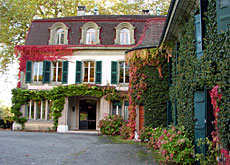New blood to tell story of Swiss émigrés

Geneva's foundation for the history of the Swiss around the world has two new directors, who are keen to tell the story of why Swiss chose to uproot themselves.
As their first task, Bénédict de Tscharner and Anselm Zurfluh want to attract more visitors to the foundation’s museum.
The museum, housed in the 18th-century Chateau de Pênthes near the United Nations in Geneva, traces the history of Swiss émigrés from the 15th century to the present day.
Both the new directors have ideas about how they want to tell the story of the Swiss abroad. For de Tscharner, a former ambassador to Paris, personal histories are important. “Through what happens to people, you get a different approach to history,” he says.
Zurfluh, a historian, is keen to explode the myth that the Swiss often went abroad because they were destitute. “It’s not poverty that made them emigrate. They just wanted to do something else.”
50 years of service
De Tscharner is taking over from Jean-René Bory, the former director of the foundation and the museum, who is retiring. He will remain honorary president of the foundation.
Bory’s contribution has been considerable. He has presided over the museum for almost half a century, since it was founded in Coppet to its present site at Pênthes.
When speaking, the curator from Vaud refers a lot to Gonzague de Reynold, the historian from Fribourg with whom he sketched out the fist outline of the museum.
If the “eternal directions and the permanent characteristics” are respected, we are well placed to put the current questions about Switzerland’s place in the world into context,” Bory told swissinfo.
Safeguarding history
De Tscharner says he intends to keep to the spirit of the foundation’s pioneers and safeguard the museum’s collections, which include journals, armour, furniture and photographs from the Swiss abroad.
This sentiment is shared by Zurfluh, the new museum director and a historian specialising in the 18th century and alpine civilisations.
“The Chateau de Pênthes is a place of memory and a laboratory of knowledge,” he says.
New direction
De Tscharner has many plans but to achieve them he needs to “look out for every centime”. He also relies on donations.
One of his projects involves extending the themes covered by the museum. As a former diplomat specialising in economic affairs, he is particularly taken by the part of the museum devoted to Swiss entrepreneurs who have gone abroad to conquer foreign markets.
He would also like to create “a type of virtual gallery” in which Swiss artists who have lost touch with home could be better appreciated by their compatriots.
Above all, Tscharner says that it is the emphasis on personal histories that is the most interesting aspect of the museum. “Through what happens to people, you get a different approach to history,” he explained.
Old myths
For Zurfluh, history repeats itself, and this is something he wants to get across. In the 18th-century, he says, many Swiss were opposed to an alliance with France.
“At the time, people were using the same arguments as they use today against Switzerland joining the United Nations or the European Union.”
Zurfluh hopes that the museum and its archives will be seen as a potential source of information for students.
He also intends to publicise recent or future publications about the Swiss in Algeria and Poland, as well as a book about those from the Italian-speaking Ticino who left to seek their fortune abroad.
The museum is open from Monday to Friday from 09.00 – 12.00 and 14.00 – 17.00
swissinfo, Bernard Weissbrodt and Isobel Johnson
In the 1950s, the original plan was to set up a museum in former quarter of the Swiss guards in the Chateau of Versailles, in France.
A museum was eventually created in 1960 at Coppet in canton Vaud.
In 1978, it moved to the Chateau de Pênthes in Geneva.
In 2001, the foundation and the museum changed their name from the Swiss Abroad to the Swiss around the world.

In compliance with the JTI standards
More: SWI swissinfo.ch certified by the Journalism Trust Initiative

You can find an overview of ongoing debates with our journalists here. Please join us!
If you want to start a conversation about a topic raised in this article or want to report factual errors, email us at english@swissinfo.ch.